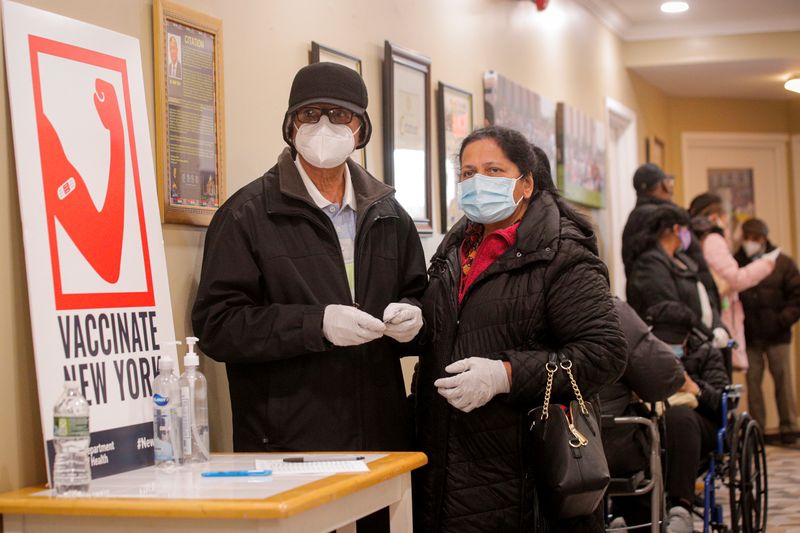By Peter Szekely
NEW YORK (Reuters) - Mayor Bill de Blasio’s chief medical adviser on Thursday downplayed the results of two studies showing that a new coronavirus variant found in New York City in November may be more resistant to vaccines now being administered.
Dr. Jay Varma said it was premature to infer from laboratory results how effective the vaccines would be on the variant, echoing concerns of other scientists who questioned why preliminary studies are given to the media ahead of academics.
“We really don't know enough about human immunity to draw those direct conclusions,” Varma said at a briefing along with the mayor. “That's why we do clinical trials. That's where we collect data continuously.”
Clinical trials of the vaccines, Varma noted, including those done in other countries, such as Brazil and South Africa, where the yet-to-be approved Johnson & Johnson (NYSE:JNJ) vaccine was tested, have shown that they are “incredibly effective” at preventing death and severe illness.
Highly contagious variants of the virus first discovered and now prevalent in South Africa and Brazil have been spreading widely to other countries.
In the United States, where the virus that has taken more than 500,000 lives over the past 13 months, new infections and deaths have been on the decline in recent weeks.
Hospitalizations - a key indicator for public officials worried about overwhelming local healthcare systems - were down nearly 60% from their Jan. 6 peak at 53,938 patients, according to a Reuters tally.
Even with the declining trend, deaths mounted in California, where total fatalities topped 50,000 on Wednesday, followed by New York, the early epicenter of the U.S. outbreak, with 46,871.
The Centers for Disease Control and Prevention estimated that 45.2 million people in the United States have received at least one dose of the authorized two-shot COVID-19 vaccines from Pfizer Inc (NYSE:PFE) and partner BioNTech SE (NASDAQ:BNTX) or Moderna (NASDAQ:MRNA) Inc. J&J's one-shot vaccine is widely expected to be authorized for emergency use within days.
The new variant, called B.1.526, represented about 12% of New York City cases by mid-February, according to researchers at Columbia University Vagelos College of Physicians and Surgeons.
Another study published online this week by the California Institute of Technology also described the new variant. Neither has been peer-reviewed.
The Columbia researchers found that B.1.526 shares some worrying characteristics with the South Africa and Brazil variants, that several studies have suggested are more resistant to some existing vaccines than earlier versions of the coronavirus.
The CDC has identified more than 1,900 cases of coronavirus variants spread across most states in the country, mostly the B.1.1.7 variant first identified in the United Kingdom, which has been shown to be more transmissible than earlier versions of the virus.
Varma urged readers to be "a little skeptical" of reports of the latest studies, adding that not all variants rise to the level of public health concerns. He characterized the latest discovery as a "variant of interest" that should be studied more closely.
New York City Health Commissioner Dave Chokshi called the studies "quite exploratory with respect to the real-world effects," adding that there is no indication that the new variant reduces vaccine effectiveness.
Earlier, Varma took to Twitter to urge researchers to share their work with government health departments before releasing them to the press, adding, "Pathogen porn isn’t helping public health."
California cardiologist Eric Topol echoed Varma's concerns about unnecessarily spreading fear, calling the New York variant a "scariant."
Yale University Professor Nathan Grubaugh called conclusions drawn from the two studies "an absolute mess."
